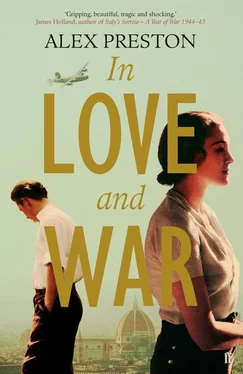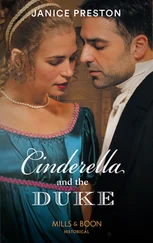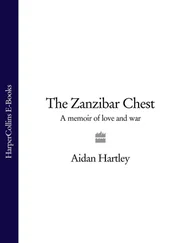Now he takes her in his arms on the beach, aware there must be eyes watching them from the slumbering town, but not wanting to miss this, their toes icy in the surf, his cast heavy on her shoulder. Sun ranges across the sea, now blue and sparking green. He kisses her and she pulls him urgently towards her. A spray of sand and salt water covers them, and he is suddenly aware how far from safety they are, how alone. They break apart, pulling their socks and shoes back onto pale blue feet. Esmond hooks his cast back in the sling, and they make their way up to the train station.
It is not until the beginning of December, when, en route to Malta, three Poeti -class destroyers are intercepted by Royal Navy corvettes off Lipari and sunk, that they see the fruits of their mission. Bruno, the Professor, Antonio Ignesti and Tosca Bucarelli come to L’Ombrellino to congratulate them. Esmond and Ada are in the kitchen with Tatters when the four appear at the bottom of the terrace, coming up the stone steps by the swimming pool. An unlikely gang — the Professor, slightly stooped, a bottle of wine in each hand, stumbling every so often on the icy gravel, Bruno swinging a whole cured ham, scarf furled around his neck like an undergraduate, Antonio with one arm around Tosca, the other heaving a shopping basket full of pasta and cabbages. He is sturdy and shaven and she blonde and childlike beside him. Tatters gallops down to greet them, speechless with joy at their coming, bouncing up and down until he is tickled and fed a chunk of ham by Bruno.
They sit in the kitchen around another perilous fire, snow falling thickly outside. Corks are pulled from bottles, a pan of water set to boil on the stove, ham and salami sliced on the sideboard. There is an air of quiet satisfaction, of having done something meaningful for Europe, for humanity. The wireless is brought down to the kitchen, and they listen to the news on Radio Vaticana. It is possible, as 1942 runs out of breath, to feel better.
The Allies are on top in most places. Rommel is stuck in Tunisia; the Germans stewing in Stalingrad; the Japanese fading at Guadalcanal. The American war machine is gathering: their bombs fall constantly. Malta — absurdly, it seems to Esmond — stands firm. And here in Italy the Professor tells them of Mussolini’s son-in-law, Ciano, uttering rebellious murmurs in Rome as more and more Alpini are fed into the maw of the Eastern Front. Slogans have begun to appear on the streets of Florence. Viva Il Duce and Credere, Obbedire, Combattare are replaced by Non Mollare! and Ricordiamo Matteotti .
The Professor raises his glass. ‘To Esmond and Ada,’ he says, grinning. ‘And to Oreste Ristori, the madman.’
‘And to me,’ Tosca says. ‘It’s my twentieth birthday today.’ Esmond hugs her, Bruno uncorks a bottle of spumante , the Professor beams soppily as Ada serves out bowls of ravioli. Tatters settles down in Bruno’s lap and begins to snore as they talk about the war.
After eating, they go to stand in the drawing room where Esmond lights another fire, burning more of the vine branches that fill the bothies beside the villa. Firelight plays on their faces as they lounge on divans, the Professor sprawled in an armchair, Tosca and Antonio beginning to dance as Ada winds up the gramophone. Bruno is by the window smoking a cigarillo, looking down over Florence.
The Professor swirls the flat wine in his glass. ‘All wars are civil wars,’ he says woozily, ‘because all men are brothers.’ Dusk has fallen and the city is a mass of shadows under the hills. Esmond goes to stand beside Bruno.
‘You did well,’ Bruno says. ‘Ada told me.’
‘It was a test, I suppose?’
‘It was a success. That’s all that matters.’ Bruno breathes out smoke against the window. ‘Those ships might have made the difference for Malta. Malta might make the difference to the war. Everything is connected, especially at a time like this.’
They are silent for a while. Bruno turns towards him and Esmond watches his thin profile in the glass.
‘We must all choose sides, you know,’ he says.
‘I have.’
‘You’re doing the right thing, certainly. Do you want a cigarillo?’
‘Thanks.’
Esmond sees the flame flare in the window. Two heads bend inwards and two red points separate. The Professor leads Ada in a stately waltz beside Antonio and Tosca, the glow of firelight behind them.
‘It’s important to do the right things for the right reasons. To have ideological certainty to back up your actions.’ Bruno’s voice is soft. ‘Do you see what I mean?’
Esmond swallows the last of his champagne. He feels oddly nervous.
‘It’s extraordinary,’ he says. ‘Stalingrad. I mean horrifying, but also terribly moving. Ada and I listen to Radio Moscow in the evenings, when they broadcast in English, and the way the Russians are laying down their lives, that kind of ecstatic self-sacrifice. They have something we don’t.’
‘Noble, isn’t it?’ Bruno turns and smiles. A beat. ‘You’ll want to rescue your fiancée from the Professor. She’s beginning to look desperate.’
Esmond and Ada stand at the door a few hours later and watch the four of them stagger down the path towards the swimming pool. They wash up together, then make their way to bed, bundled against the cold. Esmond has found an old tweed jacket of George Keppel’s that he wears to sleep. They have talked about bringing the mattress down to the kitchen, but Esmond says there’s something medieval about the idea, and they like the cool light of mornings in the studio, the view down over the city, the sense of sleeping away from a sordid day in the city’s life.
In bed that night, he waits until she is asleep and crawls along the floor to light the stubby candle in front of the triptych. He thinks of the Italian sailors on the boat, imagines the shock of the torpedo blasts, the way the air would have been sucked out of the cabins, how quickly they went down. He wonders how many of the men on board read poetry, how many had a novel they were working on, or a girl like Ada waiting at home. He wonders how many were locked in each other’s arms, in the snug of a hammock below deck, when the torpedoes struck. He’d heard that drowning was an easy way to go once the first lungful of water was drawn in. He looks up at the face of Mary Magdalene and finds himself mouthing something close to a prayer.
‘You don’t believe in God now, do you?’ Ada, wearing a thick jumper over one of Alice Keppel’s nightdresses, is raised on her elbow, watching him.
‘Of course not,’ he says.
‘I like having the paintings here, but not if they’re making you superstitious. I won’t be with a religious man.’
‘I was just thinking about the sailors, about how they died.’
‘You can’t have those thoughts. We’re at war. Now blow out the candle.’
He does so and lies beside her, looking up into the darkness until it is almost dawn, then gets up and takes Tatters downstairs. He lets the dog out into the garden and goes back inside. He sees, by the fire, a red leather book. Il Manifesto del Partito Comunista . He opens it and begins to read — ‘Borghese e Proletari . The story of every society up to this point is a story of class struggles.’ He hears Tatters scratching at the kitchen door. He smiles, closes the book. The dog, with a proud little wag, deposits a baby rabbit on the mat, still weakly twitching, its back broken. Tatters looks up at Esmond with jubilant eyes, then turns tail and rushes back into the garden, barking joyously. By the time they eat breakfast, there are six, soft, motionless pouches of fur curled up on the mat.
‘I’ll cook them for lunch,’ Ada says, smiling.
Читать дальше












